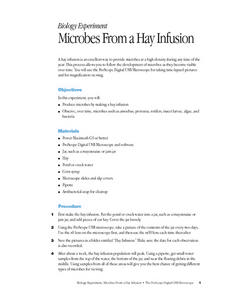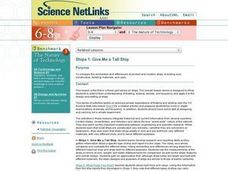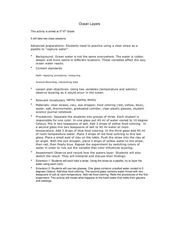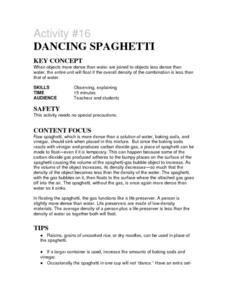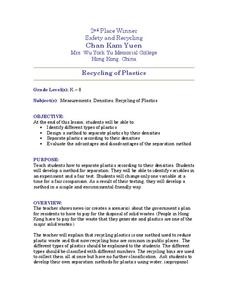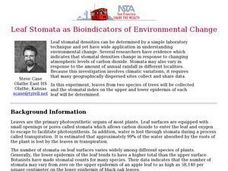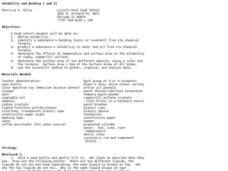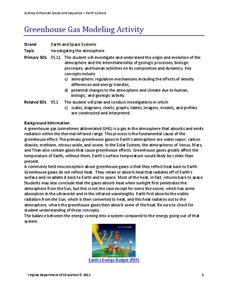Curated OER
Microbes From a Hay Infusion
Learners observe, over time, microbes such as amoebas, protozoa, rotifers and insect larva. They create a hay infusion culture using pond water then sample and record organisms found over a two week period.
Curated OER
Biomanipulation
Students explore the effects of aquatic trophic relationships on water transparency. They observe and explain the effects of reducing nutrient inputs on agal density on water transparency.
Curated OER
Invasives and Macroinvertebrates
Students view macroinvertebrates, or discuss previous collection activity. They graph data on macroinvertebrates in the Hudson River. Students discuss the relationship between habitat, environmental changes, and invertebrate diversity or...
Curated OER
Give Me a Tall Ship
Sixth graders develop an understanding of floating, sinking, density, and buoyancy and apply it to the design of testing of ships.
Curated OER
Examine Methods of Reporting Research Results
Learners analyze a research report and the list of components needed in a research report and then identify those components based on a set of standards using the scientific method. They collect data which can be used for a graphical...
Curated OER
Adaptation and Diversity on Sheffield Island
Written for an exploration of shoreline ecosystems on Sheffield Island, this gives ecology or marine biology buffs a hands-on experience. Using GPS or visual triangulation techniques, they lay transect lines on a high and a low energy...
Curated OER
Ocean Layers
Students investigate how temperature and salinity causes ocean layering. In this ecology lesson, students observe and sketch their experimental result. They report their findings in class.
Curated OER
Activity #16 Dancing Spagehetti
Students experiment with floating the spaghetti, the gas functions like a life preserver. Pupils comprehend that a person is slightly more dense than water. They comprehend that a life preservers are made of low-density materials. The...
Curated OER
What Boat Designs Float the Best?
Fifth graders investigate buoyancy by conducting a science experiment. In this water properties lesson plan, 5th graders predict which of their different paper boat designs will float for the longest period. Students conduct...
Curated OER
Recycling of Plastics
Students separate plastics according to their densities, develop a method for separation and identify variables in an experiment and a fair test, changing only one variable at a time for a fair comparison. After testing, they develop a...
Curated OER
Thermo and Fluid Dynamics of a Homemade "Lava Lamp"
Students construct their own lava lamp using simple substances. In this physics lesson, students explain how difference in density causes convection. They solve for forces and buoyancy using mathematical equations.
Curated OER
Creating the Ideal Cargo Boat
Students build boats out of clay to test the buoyancy of the boat in water. Students break into pairs and construct their boat to specific guide lines, then experiment with their boat in the water.
Curated OER
Leaf Stomata as Bioindicators of Environmental Change
Students perform an experiment to determine the stomaltal index on the upper and lower epidermis of two species of leaves. Stomatal densities change in response to changing atmospheric levels of carbon dioxide and to annual rainfall.
Curated OER
Leaf Stomata as Bioindicators of Environmental Change
Students, in this experiment, collect leaves from two species of trees and the stomatal index on the upper and lower epidermis of each leaf be determined.
Curated OER
Bending Light
Sixth graders read Hatchet by Gary Paulsen, discuss refraction, identify example of it from novel, and perform classroom experiments demonstrating refraction and reflection.
Curated OER
It's a Gas - Natural Gas
Learners use plastic bottles, water, and condiment packets to simulate how natural gas comes from decaying ocean plants and animals. In this natural gas lesson plan, students also fill out lab packets and answer exit questions.
Curated OER
The Great Heat Escape
Students observe a demonstration on the role of thermal conductivity in heat transfer. In this thermal conductivity lesson, students design and conduct an experiment to compare the thermal conductivity of four substances....
Curated OER
Sea and Ice Salinity
Learners conduct an experiment. In this salinity lesson, students learn about sea ice, why it is important and how changing amounts can affect the sea. Learners conduct an experiment to find out the effects of salinity on the...
Curated OER
Gel Electrophoresis
Learners conduct a variety of experiments to explore gel electrophoresis. In this biology lesson, explain how this process separate DNA and RNA. They discuss the practical applications of this method.
Curated OER
Weather, Sea Level Rise and Climate Change Course
Learners explain the impact of glacial melting to global climate change. In this environmental science lesson, students design an experiment to investigate the effect of salinity change to melting glaciers. They share their results to...
Curated OER
The Solar System
Third graders investigate Newton's law of Motion. In this chemical reaction lesson plan, 3rd graders participate in an experiment with rockets to study Newton's law. Students observe the effects of a chemical reaction made by...
Curated OER
What is an Estuary?
Students define the terms estuary and watershed. They conduct an experiment to determine the density differences between fresh and saltwater. They examine the salinity distribution of the Peconic Bay Estuary.
Virginia Department of Education
Greenhouse Gas Modeling Activity
Why are greenhouse gases called greenhouse gases? Young Earth scientists learn about greenhouse gases though experimentation in the second installment of a 3-part series. They use lamps to model radiant energy as well...
